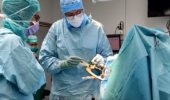Artificial Intelligence predicts Amyotrophic Lateral Sclerosis with 87% accuracy, according to study published in Nature Machine Intelligence
The study by the University of Bielefeld (Germany), published in Nature Machine Intelligence, analyzed the genotypic profiles of 3,000 patients with Amyotrophic Lateral Sclerosis (ALS), revealing the complex genetic architecture that causes its onset. The team led by Professor Alexander Schönhuth used AI methods to predict the onset of the disease with high precision, providing valuable information for early diagnosis. ALS is hereditary but 80% of its inheritance is still unexplained, making Schönhuth’s work crucial for future research. The study conducted by Schönhuth and his team using artificial intelligence methods was able to analyze the genetic data of 3,000 ALS patients and 7,000 people without ALS, revealing more than 900 genes that play a role in the development of the illness. The AI method used, called “Capsule Networks”, was able to capture overlapping processes that classical methods cannot handle. The accuracy of the AI method in predicting ALS was 87%, making it much more accurate than other methods. The team concluded that their findings could help people with ALS adjust their lifestyle and reduce the risk of developing the disease, and could also be used for the development of specific medicines. The project was funded by the European Union and coordinated by the universities of Bielefeld and Milan.

Drones for transporting blood samples: first flight test in Italy





